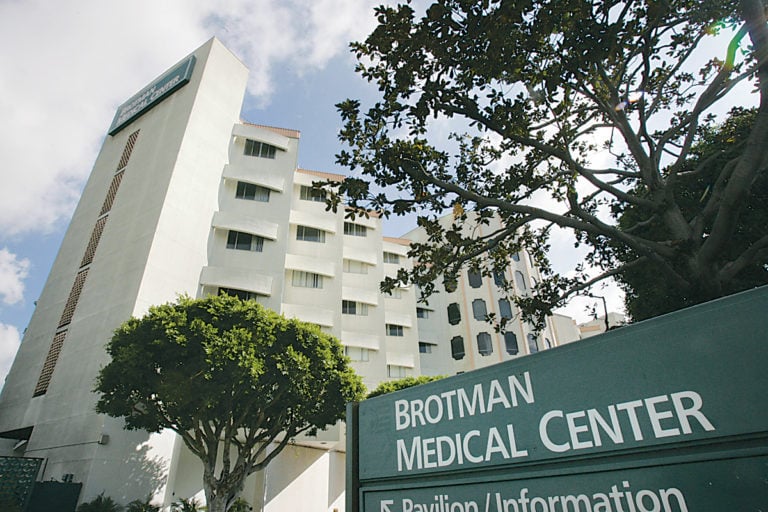
Hospitals that treat large populations of patients insured by cheaper, managed care plans are expected to do well under national health care reform.
Analysts believe that is what spurred West L.A. leveraged buyout firm Leonard Green & Partners to take Prospect Medical Holdings Inc. private in a $205 million deal.
Prospect, also of West Los Angeles, operates five hospitals, including Culver City’s Brotman Medical Center, with a combined 759 beds that treat a healthy dose of managed care patients. Shareholders will be paid $8.50 a share, a 39 percent premium on Prospect’s closing price the day before the Aug. 16 announcement.
Prospect said that insiders have committed their 10.4 million shares – nearly 50 percent of outstanding shares – in favor of the deal. About 4.2 million of those shares are to be exchanged for cash and the remainder traded for stock of the acquiring entity to be set up by Leonard Green. It’s so far unclear, but the private equity firm looks like it will end up being the largest single shareholder.
Insiders such as Chief Executive Samuel Lee, the largest shareholder with a nearly 24 percent stake, and director Dr. Jeereddi Prasad, the sixth largest shareholder at nearly 2 percent, are expected to exchange most of their shares for a stake in the new entity.
Prospect founder and fourth largest shareholder Dr. Jacob Terner, who no longer has an active role in the company, could earn as much as $8.5 million if he cashes out his holdings.
More than a half-dozen shareholder litigation firms are investigating whether minority shareholders are being shortchanged in the deal, but analysts said the transaction is likely to be found a fair one.
Douglas Dieter, who covers the company for Century City’s Imperial Capital, noted that Prospect has been trading between $6 to $7 per share since early this year. In addition, under the agreement, Prospect has the right to seek competing acquisition proposals until Sept. 25. And though hospitals that have low patient care costs could outperform others under the recently passed national health care package, there is still plenty of uncertainty on final rules that could spook investors. So, now is a good time to go private.
“They put up a solid (second) quarter,” Dieter said. “But from a market basis, they were offered a premium to what the market has allowed them to trade and I don’t know how you can dispute that.”
Prospect and Leonard Green executives did not return calls for comment.
Leonard Green is better known for its investment in large retail chains, including Whole Foods and the Container Store, but does have some experience in the health sector, including a stake in IMS Health Inc. IMS provides market data and consulting services to pharmaceutical companies.
Off to Court
A judge is allowing Dr. Zein Obagi to proceed to trial in his lawsuit against the skin care company he founded in 1988 but has since accused of interfering with his latest firm.
The Beverly Hills celebrity dermatologist in February sued Obagi Medical Products Inc., alleging that the public Long Beach company engaged in anticompetitive practices that hurt ZO Skin Health, a private company that has been selling products since 2006.
Los Angeles Superior Court Judge Daniel Buckley decided in July to allow the case to proceed to trial in February.
Obagi Medical makes specialized skin care products sold in doctor’s offices that are prescribed after cosmetic surgery and other procedures. ZO offers similar products – but on a nonprescription basis – that are sold at upscale retailers such as Nordstrom.
Obagi Medical has claimed that its founder violated a noncompete clause when ZO entered into an agreement to be acquired by Obagi Medical’s Japanese partner, Rohto Pharmaceutical.
In an earlier interview, Zein Obagi denied violating the clause, contending he only had to give his old company the right of first refusal on any new products he developed. He also said he thought he had Obagi Medical’s blessing to be acquired by Rohto, but claims Obagi Medical had second thoughts about the acquisition since it would allow Rohto to enter the China market first. In his lawsuit, he claims Rohto was pressured to kill the deal.
Obagi Medical, in its second quarter conference call Aug. 5, said that defending itself from the lawsuit would likely cost at least $6 million this year alone.
Irina Rivkind, an analyst at Memphis, Tenn.-based Duncan-Williams Inc., said she expects Obagi Medical will have to spend at least $4 million more next year fighting the case.
“We are not ruling out a settlement at this time since it may be more expensive to (Obagi Medical) to keep paying legal fees than settling the case,” she said in a client note.
Zein Obagi’s attorney, Matthew Close, said the judge did not strike any allegations, indicating it’s a strong case.
“ZO Skin Health’s lawsuit presents clear evidence that OMP improperly attempted to prevent ZO from marketing and selling its line of products to consumers,” said Close, of O’Melveny & Myers LLP.
Obagi Medical has declined to discuss pending litigation.
Staff reporter Deborah Crowe can be reached at [email protected] or at (323) 549-5225, ext. 232.
